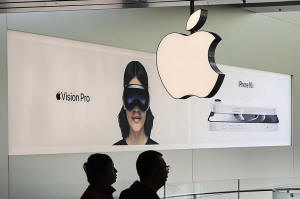Trump's commerce secretary says new electronics tariff exemptions are
temporary, chip tariffs coming
[April 14, 2025] By
MAE ANDERSON and MATT O'BRIEN
NASHVILLE, Tenn. (AP) — Tariff exemptions announced Friday on
electronics like smartphones and laptops are only a temporary reprieve
until the Trump administration develops a new tariff approach specific
to the semiconductor industry, U.S. Commerce Secretary Howard Lutnick
said Sunday.
White House officials, including President Donald Trump himself, spent
Sunday downplaying the significance of exemptions that lessen but won't
eliminate the effect of U.S. tariffs on imports of popular consumer
devices and their key components.
“They’re exempt from the reciprocal tariffs but they’re included in the
semiconductor tariffs, which are coming in probably a month or two,”
Lutnick told ABC's “This Week” on Sunday.
Trump added to the confusion hours later, declaring on social media that
there was no “exception” at all because the goods are “just moving to a
different" bucket and will still face a 20% tariff as part of his
administration's move to punish China for its role in fentanyl
trafficking.
The Trump administration late Friday had said it would exclude
electronics from broader so-called reciprocal tariffs, a move that could
help keep the prices down for phones and other consumer products that
aren’t usually made in the U.S.
China's commerce ministry in a Sunday statement welcomed the change as a
small step even as it called for the U.S. to completely cancel the rest
of its tariffs.

Sparing electronics was expected to benefit big tech companies like
Apple and Samsung and chip makers like Nvidia, though the uncertainty of
future tariffs may rein in an anticipated tech stock rally on Monday.
U.S. Customs and Border Protection said items like smartphones, laptops,
hard drives, flat-panel monitors and some chips would qualify for the
exemption. Machines used to make semiconductors are excluded too. That
means they won’t be subject to most of the tariffs levied on China or
the 10% baseline tariffs elsewhere.
It was the latest tariff change by the Trump administration, which has
made several U-turns in its massive plan to put tariffs in place on
goods from most countries. White House officials sought to dismiss any
suggestion of a reprieve as the weekend progressed.
“It’s not really an exception. That's not even the right word for it,”
U.S. Trade Representative Jamieson Greer told CBS’ “Face the Nation” on
Sunday. “This type of supply chain moved from the tariff regime for the
global tariff, the reciprocal tariff, and it moved to the national
security tariff regime.”
Greer added that “the president decided that we’re not going to have
exemptions. We can’t have a Swiss cheese solution to this universal
problem that we’re facing.”
On Air Force One Saturday night, President Donald Trump told reporters
he would get into more specifics on exemptions on Monday. In his post
Sunday on TruthSocial, he promised the White House was “taking a look at
Semiconductors and the WHOLE ELECTRONICS SUPPLY CHAIN.”
[to top of second column] |

Chinese people visit an Apple Store, inside a shopping mall, in
Beijing, Thursday, April 10, 2025. (AP Photo/Andy Wong)
 Some had assumed the exemption filed
Friday night reflected the president’s realization that his China
tariffs are unlikely to shift more manufacturing of smartphones,
computers and other gadgets to the U.S. any time soon, if ever.
The administration has predicted that the trade war prod Apple to
make iPhones in the U.S. for the first time, but that was an
unlikely scenario after Apple spent decades building up a finely
calibrated supply chain in China.
It would take several years and cost billions of dollars to build
new plants in the U.S., burdening Apple with economic forces that
could triple the price of an iPhone and torpedo sales of its marquee
product.
The turmoil has battered the stocks of tech’s “Magnificent Seven” --
Apple, Microsoft, Nvidia, Amazon, Tesla, Google parent Alphabet and
Facebook parent Meta Platforms.
At one point, the Magnificent Seven’s combined market value had
plunged by $2.1 trillion, or 14%, from April 2 when Trump unveiled
sweeping tariffs on a wide range of countries. When Trump paused the
tariffs outside of China on Wednesday, the lost value in those
companies was pared to $644 billion, or a 4% decline.
An electronics exemption would fulfill the kind of friendly
treatment that industry was envisioning when Apple CEO Tim Cook,
Tesla CEO Elon Musk, Google CEO Sundar Pichai, Facebook founder Mark
Zuckerberg and Amazon founder Jeff Bezos assembled behind the
president during his Jan. 20 inauguration.
That united display of fealty reflected Big Tech’s hopes that Trump
would be more accommodating than President Joe Biden’s
administration.
Apple won praise from Trump in late February when the Cupertino,
California, company committed to invest $500 billion and add 20,000
jobs in the U.S. during the next four years. The pledge was an echo
of a $350 billion investment commitment in the U.S. that Apple made
during Trump’s first term when the iPhone was exempted from China
tariffs.
An electronics exemption would remove “a huge black cloud overhang
for now over the tech sector and the pressure facing U.S. Big Tech,”
said Wedbush analyst Dan Ives in a research note. Ives amended that
note after Lutnick's comments Sunday, saying the confusing news out
of the White House “is dizzying for the industry and investors and
creating massive uncertainty and chaos for companies trying to plan
their supply chain, inventory, and demand.”

Neither Apple nor Samsung responded to requests for comment over the
weekend. Nvidia declined to comment.
___
O'Brien reported from Providence, Rhode Island. AP White House
correspondent Darlene Superville in West Palm Beach, Florida, and AP
Technology Writer Michael Liedtke in Berkeley, California
contributed to this report.
All contents © copyright 2025 Associated Press. All rights reserved |